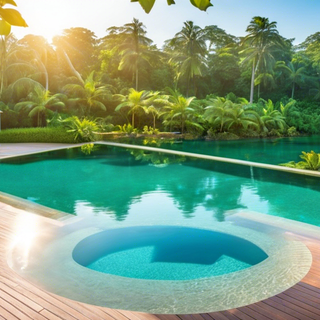Pool chemicals play a vital role in maintaining the cleanliness and safety of your swimming pool. Proper pool care involves understanding the secrets behind these chemicals to ensure your pool remains a refreshing oasis for you and your family.
Understanding Pool Chemicals
Pool chemicals can be overwhelming for beginners, but with the right knowledge, you can easily master the art of pool maintenance. Chlorine is a common pool sanitizer that helps kill bacteria and algae. pH balancers like muriatic acid or soda ash help maintain the water's acidity levels, preventing skin and eye irritation. Algaecides are used to prevent algae growth, while shock treatments eliminate organic contaminants.
- Chlorine: Acts as a sanitizer to keep the pool water clean and safe for swimming. It kills harmful bacteria and prevents algae growth.
- pH Balancers: Maintain the water's acidity levels within the recommended range, typically between 7.2 and 7.6, to prevent skin and eye irritation.
- Algaecides: Prevent the formation and growth of algae, which can make the pool water cloudy and slippery.
- Shock Treatments: Eliminate organic contaminants like sweat, sunscreen, and debris, keeping the water crystal clear.
Properly balancing these chemicals is essential for ensuring that your pool water is clean, clear, and safe for swimming. Regular testing and adjustment of chemical levels are crucial for maintaining optimal water quality.
Best Practices for Pool Chemical Maintenance
Implementing the following best practices will help you effectively manage your pool chemicals and keep your pool in top condition:
- Regular Testing: Use a reliable pool testing kit to check the chemical levels at least once a week and adjust as needed.
- Follow Manufacturer Guidelines: Always refer to the manufacturer's instructions when adding chemicals to your pool to avoid over or under-dosing.
- Store Chemicals Safely: Keep pool chemicals in a cool, dry place away from direct sunlight and out of reach of children and pets.
- Proper Dilution: When diluting chemicals, always add them to water, not water to chemicals, to prevent splashes and spills.
By following these best practices and understanding the role of each pool chemical, you can maintain a safe and inviting swimming pool for your enjoyment.




